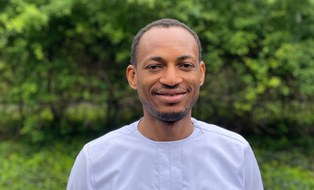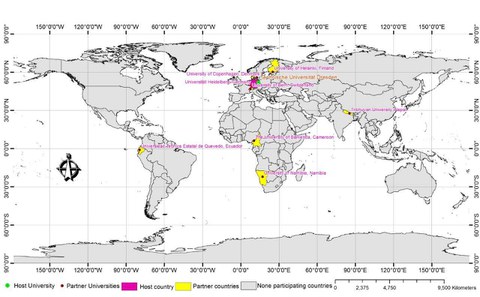Forest Institutions and International Development (FIID) Research Group
Group Leader
 © Institut
© Institut
Dr. Jude Ndzifon Kimengsi
Principal Investigator and Coordinator (AFRIKA_FORST PROJECT)
Send encrypted email via the SecureMail portal (for TUD external users only).
Professur für Tropische und Internationale Forstwirtschaft
Besucheradresse:
Cotta Bau, Room 0.06 Pienner Straße 7
01737 Tharandt
None
Background
With rising global challenges linked to deforestation and forest degradation, and the insecurity of livelihood systems, the role of forests in buffering some of these critical challenges remain primordial. While forests contribute to the livelihoods of more than 1.6 billion people – close to 25% of the world’s population (World Bank 2002; IUCN 2020), its role is particularly crucial in the global south where an estimated 68% of rural households depend on forests for livelihoods (Angelsen et al. 2014). Success in the reversal of forest loss, including its sustainable management rests, in part, on the performance of different typologies of institutions. This validates the need for renewed evidence on the nature of institutions required to regulate forest access, use and management in different contexts across the globe. With these issues in mind, the Forest Institutions and International Development (FIID) Research Group strives to advance theoretical perspectives which ‘marry’ the Actor Centred Power approach (Krott…Giessen et al. 2014) and institutionalism, in bid to understand how these shape forest use and management in diverse contexts. Drawing from a proposed Critical Institutionalist Political Ecology (CIPE) approach, the FIID research is anchored on two interrelated hypotheses:
-
Locational attributes and variations in power and politics significantly explain the performance of forest management institutions.
-
Institutions exhibit stream-like attributes; ephemeral, intermittent and perennial, which differentially shape forest use outcomes.
Besides seeking to explore these assumptions, the FIID research group has recently, also gained interest to explore the links between forestry and health, particularly in the realm of pandemics. In this light, we seek to contribute to the triple objectives of pandemic prevention, livelihood sustainability and forest-based institutional design, by developing scientific knowledge on changing compliance with forest management institutions, in the context of pandemics in the global south. The FIID group therefore seeks to advance this by proposing a Critical Institutionalist Political Ecology (CIPE) approach to explore and validate these questions in the global south.
Figure 1. Theoretical/methodological anchor of the FIID research group
REGIONAL FOCUS
To advance our approach, we draw strongly from studies in the global south, with a perspective of furthering these questions with partners in the so-called global north. Figure 2 shows the partnership base of the FIID Group.
Figure 2. Partners of the FIID Research Group
TEAM MEMBERS
 © TUD
© TUD
Post-doc (Nepal)
NameDr. Shambhu Charmakar
Research Assistant
Send encrypted email via the SecureMail portal (for TUD external users only).
 © Raphael Owuso
© Raphael Owuso
Post-doc (Ghana)
NameDr. Raphael Owusu
Research Assistant
Send encrypted email via the SecureMail portal (for TUD external users only).
Professur für Tropische und Internationale Forstwirtschaft
Besucheradresse:
Cotta Bau, Room 0.05 Pienner Straße 7
01737 Tharandt
None
 © TUD
© TUD
Doctoral Candidate (Ghana)
NameAmetus Kuuwill M.Sc.
Research Assistant
Send encrypted email via the SecureMail portal (for TUD external users only).
Professur für Tropische und Internationale Forstwirtschaft
Besucheradresse:
Cotta Bau, Room 0.05 Pienner Straße 7
01737 Tharandt
None

Doctoral Candidate
NameAishwarya Raja M.Sc.
Research Assistant
Send encrypted email via the SecureMail portal (for TUD external users only).
Certificate of DFN-PKI for encrypted email communication.
Visiting address:
Cotta Bau, Room 0.05 Pienner Straße 7
01737 Tharandt
ASSOCIATE MEMBERS
Gordon Manu (Ghana)
Balgah Roland (Cameroon)
Prabin Bhusal (Nepal)
Maria Fernanda Gebara (Brazil)
Yamikani Makwinja (Malawi)
SENIOR ADVISERS:
Prof. Dr. Lukas Giessen
Prof. Dr. Juergen Pretzsch
Prof. Dr. Gertrud Buchenrieder
Prof. Dr. Tobias Haller Assoc. Prof. Dr. Mariève Pouliot
PROJECTS
-
Past customs, current law: Analyzing the effects of endogenous and exogenous institutions on sustainable forest management in Cameroon (2020-2023), funded by the DFG.
-
Special Issue with Forest Policy and Economics on “The governance of forests, forest products and markets: Multiscale linkages to conflict and development in sub-Saharan Africa”; https://www.journals.elsevier.com/forest-policy-and-economics/call-for-papers/special-issue-on-the-governance-of-forests-forest-products)/
-
Sustaining livelihoods in forest reserve communities of Cameroon: The role of endogenous cultural institutions: Funded by Technische Universitat Dresden’s Excellence Initiative/German Research Foundation (DFG) Grant.
RECENT PUBLICATIONS
- Kimengsi, J. N., Owusu, R., Djenontin, I. N. S., Pretzsch, J., Giessen, L., Buchenrieder, G., Pouliot, M., & Acosta, A. N. (2022). What do we (not) know on forest management institutions in sub-Saharan Africa? A regional comparative review, Land Use Policy, 114(2022), 105931, https://doi.org/10.1016/j.landusepol.2021.105931
- Kimengsi, J.N., Owusu, R. & Balgah, R.A. (2022) Nexus approach and environmental resource governance in Sub-Saharan Africa: a systematic review. Sustain Sci (2022). https://doi.org/10.1007/s11625-021-01079-7
- Kimengsi, J. N. & Mukong, A. K. (2022). Forest resource endogenous cultural institutions in rural Cameroon: Compliance determinants and policy implications, Journal of Environmental Planning and Management, https://doi.org/10.1080/09640568.2022.2034606
- Kimengsi, J. N., Mukong, A. K., Giessen, L., Pretzsch, J. (2022). Institutional dynamics and forest use practices in the Santchou Landscape of Cameroon, Environmental Science and Policy (128), 2022, 68-80, https://doi.org/10.1016/j.envsci.2021.11.010
- Shahi, N., Bhusal, P., Poudel, G., & Kimengsi, J. N. (2022). Forest- People Nexus in Changing Livelihood Contexts: Evidence from Community Forests in Nepal, Trees Forests and People, https://doi.org/10.1016/j.tfp.2022.100223
- Kimengsi, J. N. and Bhusal, P. (2021). Community forestry governance: lessons for Cameroon and Nepal, Society and Natural Resources, 34(2021), DOI: 10.1080/08941920.2021.2006844
- Kimengsi, J. N., and Balgah, R. A. (2021). Colonial hangover and institutional bricolage processes in forest use practices in Cameroon, Forest Policy and Economics, 125(2021), 102406.
- Kimengsi, J. N., Abam, C. E. And Forje, G. W. (2021). Spatio-temporal analysis of the ‘last vestiges’ of endogenous cultural institutions: implications for Cameroon’s protected areas, GeoJournal (2021). https://doi.org/10.1007/s10708-021-10517-z
- Hintz, K. S., Kimengsi, J.N. & Pretzsch, J. (2021). How do smallholder forest farmers’ organizations manage and commercialize wood products? – A global systematic review, Forest Policy and Economics, 128 (102460).
- Charmakar, S., Oli, B.N., Joshi, N.R., Maraseni, T. N & Atreya, K. (2021). Forest Carbon Storage and Species Richness in FSC Certified and Non-certified Community Forests in Nepal. Small-scale Forestry 20, 199–219 (2021). https://doi.org/10.1007/s11842-020-09464-3.
- Paudel, G., Bhusal, P. and Kimengsi, J. N. (2021). Determining the costs and benefits of Scientific Forest Management in Nepal, Forest Policy and Economics, 126 (2021), 102426.
- Owusu, R., Kimengsi, J. N. and Moyo, F. (2021). Community-based Forest Landscape Restoration (FLR): Determinants and Policy Implications in Tanzania, Land Use Policy, 109(2021), 105664.
- Kunwar, R. M., Adhikari, Y. P., Sharma, H. P., Rimal, B., Devkota, H. P., Charmakar, S., Acharya, R. P., Baral, K., Ansari, A. S., Bhattarai, R., Thapa-Magar, S., Paudel, H. R., Baral, S., Sapkota, P., Uprety, Y., LeBoa, C. & Jentsch, A. (2020). Distribution, use, trade and conservation of Paris polyphylla Sm. in Nepal, Global Ecology and Conservation, 23(2020), e01081.
- Charmakar, S., Kunwar, R.M., Sharma, H.P., Rimal, B., Baral, S., Joshi, N., Gauli, K., Acharya, R.P. and Oli, B.N., 2021. Production, distribution, use, and trade of Valeriana jatamansi Jones in
Nepal. Global Ecology and Conservation, 30, p.e01792. https://doi.org/10.1016/j.gecco.2021.e01792 - Atreya, K., Subedi, B. P., Ghimire, P. L., Khanal, S. C., Charmakar, S., & Adhikari, R. (2021). Agroforestry for mountain development: Prospects, challenges and ways forward in
Nepal. Archives of Agriculture and Environmental Science, 6(1), 87-99. https://doi.org/10.26832/24566632.2021.0601012 - Mallick, B., Priodarshini, R., Kimengsi, J. N., Biswas, B., Hausmann, A. E., Islam, S., Huq, S., & Vogt, J. (2021). Livelihoods dependence on mangrove ecosystems: Empirical evidence from the Sundarbans, Current Research in Environmental Sustainability, 3 (2021), 100077.
- Tume, S.J.P. & Kimengsi, J.N. (2021). Indigenous and modern agro-based climate adaptation practices in rural Cameroon, International Journal of Environmental Studies, DOI: 10.1080/00207233.2021.1977538
- Bhusal, P., Kimengsi, J. N., and Awasthi, K. R. (2021). What drives environmental (Non-) migration around the Himalayan Region? Evidence from Rural Nepal, World Development Perspectives, 23(2021),100350.
- Hermans, K., Berger, E., Biber-Freudenberger, L., Bossenbroek, L., Ebeler, L., Groth, J., Hack, J., Hanspach, J., Hintz, K. S., Kimengsi, J. N., Kwong, Y.M. C., Oakes, R., Pagogna, R., Plieninger, T., Sterly, H., van der Geest, K., van Vliet, J. & Wiederkehr, C. (2021). Crisis-induced disruptions in place-based social-ecological research – an opportunity for redirection, GAIA - Ecological Perspectives for Science and Society, 30/2(2021):72–76.
- Kimengsi, J. N. and Mukong, A. K. & Balgah, R. A. (2020). Livelihood diversification and household well-being: Insights and policy implications for forest-based communities in Cameroon, Society and Natural Resources, 33(5), 1-21.
- Bhusal, P., Karki, P., & Kimengsi, J. N. (2020). Timber Distribution Dynamics in Scientifically managed Community Forests: Learning from Nepal, Forests 2020, 11, 1032; doi:10.3390/f11101032
- Kimengsi, J.N., Balgah, R.A., Buchenrieder, G., Silberberger, M. & Batosor, H. P. (2020). An empirical analysis of credit-financed agribusiness investments and income poverty dynamics of rural women in Cameroon, Community Development, 51(1), 72-89.
- Bhusal, P., Awasthi, K. R. & Kimengsi, J. N. (2020). User's Opinion in Scientific Forest Management Implementation in Nepal - a Case Study from Nawalparasi, District, Cogent Environmental Science 6:1, 1778987, https://www.tandfonline.com/doi/full/10.1080/23311843.2020.1778987
- Kimengsi, J. N., Aung, P. S., Pretzsch, J., Haller, T., & Auch, E. (2019). Constitutionality and the Co-Management of Protected Areas: Reflections from Cameroon and Myanmar. International Journal of the Commons, 13(2), 1003–1020. DOI: http://doi.org/10.5334/ijc.934
- Balgah, R. A. & Kimengsi, J. N. (2019). Can Policy Deviance Reduce Poverty? Empirical Evidence from Self-Return Environmental Migrants in Cameroon, International Social Science Journal, 69 (232), 87-103, https://onlinelibrary. wiley.com/journal.
- Kimengsi, J.N., Bhusal, P., Aryal, A., Fernandez, M.V.B.C., Owusu, R., Chaudhary, A., and Nielsen, W. (2019). What (De)Motivates Forest Users’ Participation in Co-Management? Evidence from Nepal. Forests 2019, 10(6),512.
- Kimengsi, J. N., Pretzsch, J., Mukong, A. K. & Ongolo, S. (2019). Measuring Livelihood Diversification and Forest Conservation Choices: Insights from Rural Cameroon, Forests 2019, 10(81), 1-16; doi:10.3390/f10020081
- Kimengsi, J. N., Mukong, A. K., Balgah, R. A., Pretzsch, J. & Kwei, J. (2019). Households’ assets dynamics and ecotourism choices in the western highlands of Cameroon, Sustainability 2019, 11(7), 1-16; doi:10.3390/su11071921.
- Kimengsi, J.N. & Balgah R.A (2017). Repositioning Local Institutions in Natural Resource Management: Perspectives from Sub-Saharan Africa. Schmollers Jahrbuch 137 (2017), 115 – 138.
- Kimengsi, J.N. (2015): Developing a Tri-Phase Model for Land Conflict Resolution in the North West Region of Cameroon. Book Chapter on “Land Reforms and Natural Resources Conflict in Africa: New Development Paradigms in the Era of Global Liberalization”. Taylor Francis, New York.
- Kimengsi, J.N. (2014): Threats to Ecotourism Development and Forest Conservation in the Lake Barombi Mbo Area of Cameroon. Journal of International Wildlife Law and Policy, 17(4), 213-230.
DOCTORAL THESES
-
Shambhu Charmakar: Reshaping Community Forestry: An Analysis of Institutional Interplay and Power Dynamics in Nepal, TU-Dresden
-
Raphael Owusu: Exogenous and endogenous institutional analysis of Forest Landscape Restoration Processes in Rural Cameroon, TU-Dresden
-
Waindum Providence: Land resource tenure systems and development implications in the western highlands of Cameroon, The University of Bamenda
-
Gwan S. Akhere: Landscape Restoration Processes and Implications in the Western Highlands of Cameroon. The University of Bamenda.
-
Kwalar Glory, The Evolution of climate adaptation practices in the Tikar Plains of Cameroon. The University of Bamenda.
-
Atiekum Zipporah: Migration and land resource use practices in the Mungo corridor of Cameroon. The University of Bamenda.
MSC THESES
-
Deborah Yeboah: Forest landscape restoration and livelihood implications in Offinso District; Ghana
-
Sumitra KC: Community Forest's Land for the Poor: Prospects and Challenges: A case study from Bhitteri Pakha CFUG, Dolakha District, Nepal.
-
Kannan U. L. Pandemics (Covid-19) and implications on forest-based livelihoods in Nepal.
-
George Acquaah: Forest Management Institutional Response to Pandemics: A Case study of Ebola and Covid-19 in Sierra Leone
PAST MSC THESES
-
2021: Ametus Kuuwill: Forest-based livelihood dependency during the coronavirus pandemic: Case study, Rural Ghana
-
2021: Kometa Raoul: Spatio-temporal institutional dynamics and implications for sustainable forest management in the Santchou and Kilum Ijim reserves of Cameroon
-
2021: Chick Emil: Endogenous cultural institutional dynamics and forest resource Management in The Santchou and Bakossi Reserves.
-
2021: Luma Vanessa Forti: Migration Patterns around the Santchou Forest Reserve in Cameroon: Forest- based practices and Management Implications
-
2021: Ngu Deodatus Ngu: Dynamics of Community Participation in Sustainable Forest Management in Kedjom Ketinguh, Tubah Sub-Division, Northwest Region of Cameroon
-
2021: Chia Michael Akumbo: The dynamics of local climate adaptation in the agricultural sector: the case of vegetable production in Tubah Sub Division, Cameroon.
-
2020: Gordon Manu: Governing Forests: Exploring Mechanisms and Outcomes for Protected Area Communities in Cameroon
-
2020: Raphael Owusu: Community-based Forest Landscape Restoration (FLR) in the Babati District of Tanzania: Determinants and Choices
-
2020: Mariafe Cornejo: Contribution of forest products and services to rural household income. Comparative Insights from the Tropical Andean Forest, Ecuador


